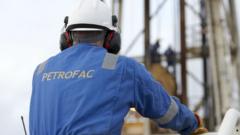Angus CochraneBBC Scotland News
Petrofac
Energy services firm Petrofac has filed for administration.
The company, which employs about 2,000 people in Scotland, said its North Sea business would continue to operate as normal.
In a statement, Petrofac said it had applied to appoint administrators for its holding company, but that alternative restructuring options were being explored.
It added that administrators would work to “preserve value, operational capability and ongoing delivery”.
The decision comes after Dutch grid operator TenneT terminated a major offshore wind contract with Petrofac, scuppering a planned financial restructuring.
The firm, which has UK offices in Aberdeen, London, Woking and Great Yarmouth, said further information on the administration process would be provided in due course.
Getty Images
Founded in Texas in 1981, Petrofac designs and builds facilities for oil, gas and renewables projects, as well as providing engineering, project management and logistical services.
It has been involved in the operation of North Sea oil platforms for firms including BP and Shell.
Once a FTSE 100 firm, the company was worth around £6bn at its peak in 2012 but it has slumped in recent years following a Serious Fraud Office investigation and a series of profit warnings.
Petrofac was worth around £20m when its shares were suspended in May. The firm has cited delays in contract payments and rising operating costs.
A company spokesman said: “Petrofac has a number of fundamentally strong businesses and we are focused on delivering the best possible outcome for them through this process.
“Our long-established North Sea business continues to operate as normal, and management are working to minimise disruption for clients and employees.”
‘Incredibly concerning’
The Aberdeen and Grampian Chamber of Commerce said it was “deeply concerned” by the announcement, which it said came at an “already worrying time for the North Sea supply chain”.
Chief executive Russell Borthwick said: “Thousands of skilled jobs across the region depend on companies like Petrofac, which sit at the heart of both our oil and gas and energy transition sectors.
“While many of Petrofac’s challenges predate the current government, this is another stark reminder that the UK government must urgently act to restore confidence and stability in the energy industry.”
Scottish Conservative energy spokesman Douglas Lumsden said oil and gas workers had been “abandoned” by both the UK and Scottish governments.
Scotland’s First Minister John Swinney described the announcement as “incredibly concerning” and said his government was ready to support Petrofac staff.
He called on the UK government to “urgently revisit” a 78% windfall tax on North Sea oil and gas profits.
UK Energy Minister Michael Shanks accused Swinney of spreading “deliberate misinformation”.
He added: “The UK arm of Petrofac is a successful, growing company and all of us have a responsibility to support it, not to undermine it.”
A spokesperson for the UK Department of Energy Security and Net Zero said the administration process was a result of “long-standing issues” in the firm’s worldwide operations.
They added: “The government will continue to work with the UK company as it focuses on its long-term future.”
Petrofac has been forced to accept that four years of trying to recover from a bribery scandal have finally run into the sand.
The parent company is in administration. The hope is that its subsidiaries can keep trading. They have lots to do, with a busy pipeline of contracts it could compete for.
But it has struggled with big debts. And as it has sought to restructure, it has faced legal challenges, still unresolved and heading for the UK Supreme Court, about that plan.
Bribery, to which an executive pleaded guilty five years ago, meant Petrofac was disqualified from bidding for some new contracts.
The firm had failed to prevent the bribes being offered or paid. Following a Serious Fraud Office investigation, starting in 2017, prosecutors claimed £57m in bribes were paid to win contracts.
The company faced a £70m fine and a £7m legal bill, as Petrofac was found to have bribed on a “systemic, serious and grave” scale to win contracts in Iraq, Saudi Arabia and the UAE.
Other contracts, such as a “Thai clean energy” project, have been loss-making and at some scale.
The restructuring plan remained on track, or at least several such plans were being worked on.
What changed last week was developer TenneT withdrawing from a contract with Petrofac to supply a complex renewable energy project in the Dutch North Sea.
That was the last straw for the restructuring plan. It’s not the end for Petrofac’s work. It could be reconstituted as a new corporate entity, or its operations could be broken up and bought by other companies.
For the 2000 people working for the company in the UK, out of 7600 around the world, including India and the Persian Gulf – there’s uncertainty, but still work to keep them busy.




